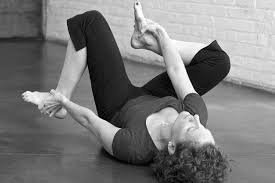Why don't you just tell me how to move?
I asked the same questions when I started taking weekly classes in New York City back in the 90s. If there were a right way to move, why didn't the teacher just say so?
I'd have this "aha" moment at the end of a lesson followed by waves of irritation at the teacher for not telling me to do it that way from the beginning. I mean, what kind of teacher was that, making me flail about for an hour?
Yes, I admit I thought like that. Little did I know that the movements I was exploring were necessary to the satisfaction of feeling something click into place.
Click: Oh, that's how to use the low back!
Click: So that's what the ribs are for!
Click: I never knew my shoulders worked like that!
And so on.
It took me years to stop wanting to be told what to do. I hated not knowing the right way, and yet most of life is spent not knowing the right way to do anything.
One Feldenkrais trainer says that the amount you can learn is directly proportional to the amount of time you can withstand not knowing.
Clearly, I had to become a slow learner. I didn't really start to learn until I left the glorified ranks of the fast learners who grasp too quickly for results and miss much in the process.
Doing a Feldenkrais lesson is now more like reading a good novel. I'm wondering which character is going to save the day: Will it be the ribs, the spine, or the hip joints?
When you are immersed in a Feldenkrais lesson, just as in a good book, you feel a kind of curiosity about how it's going to end. Of course, the story has to have a good plot, but you bring your own wonder about what's going to happen next. In a way, becoming a slow learner was like waiting to discover the end of a story.
So why don't Feldenkrais practitioners demonstrate?
Because imitating is not learning. The point of a lesson is not to study someone else's strategy, nor is it to be told what to do.
A quote from another trainer (Dennis Leri) captures this: “A lesson doesn't come across as, ‘Follow these steps and then you will be like me,’ it comes across as, "‘Follow these steps and you are going to be in the same situation I was in and you will have to dig your own way out.’”
You are thrown into whatever is your own nature. Your own set of questions start to appear to you, in the lesson and in your life.

